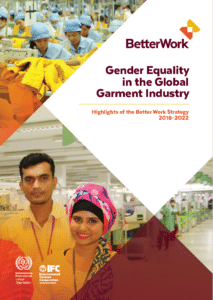Better Work’s five-year gender strategy will empower women, reduce sexual harassment and close the gender pay gap in the global garment industry.
Although women represent around 80 per cent of the workforce in the garment sector worldwide, they are concentrated in the lowest-paying, lowest-skilled occupations. Gender-based discrimination during recruitment processes and sexual harassment in the workplace remain widespread. Social norms and the predominance of working mothers also contribute to a sizeable gender pay gap, with female factory workers earning up to 21 per cent less per hour than their male counterparts.
Building on it’s on-the-ground experience and compelling research findings, Better Work’s gender strategy aims to unite partners from the public and private sector to scale up what has proven to work to empower women, increase productivity and improve the lives of workers and their family members.
The strategy will be implemented through targeted factory initiatives, and by strengthening policies and practices at the national, regional and international levels.
Download the full strategy or the highlights document to find out more.
Key research findings
♦ Better Work has decreased the gender pay gap by up to 17%, reduced sexual harassment concerns by up to 18%, and increased women’s access to prenatal care by as much as 26%.
♦ Quality jobs for women have knock-on development impacts including higher income, better health for workers and their family members and improved education for workers’ children.
♦ Improvements in working conditions are more significant when women are freely elected and fairly represented on worker – management committees.
♦ Female supervisors trained by Better Work achieved a 22% increase in productivity on their line. A workplace free of harassment also leads
to higher profitability.
Better Work’s focus on gender equality


Download Highlights in English
Download Highlights in Spanish
Discrimination
Preventing sexual harassment; tackling contractual discrimination (e.g. recruitment and occupational segregation); bridging the gender wage gap

Voice & Representation
Representation of women workers in factories’ committees (including Better Work’s worker – management committees) and trade unions, union federations, and employer organizations; voice in collective bargaining processes

Paid Work & Care
Sexual and reproductive health and rights (including pregnancy related healthcare and nutrition); maternity protection; breastfeeding; childcare

Leadership & Skills Development
Career opportunities in factories (e.g. line supervisors and management positions); leadership positions in governments, trade unions and employers organizations; financial literacy and household budget planning
